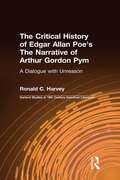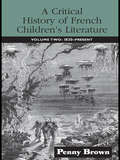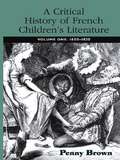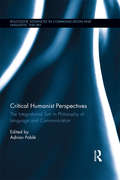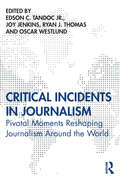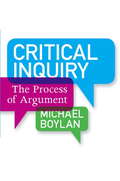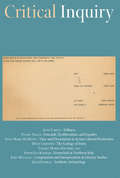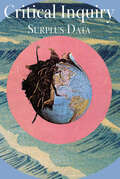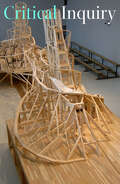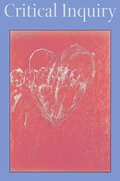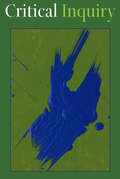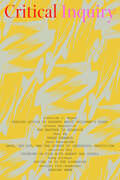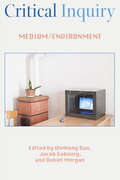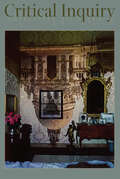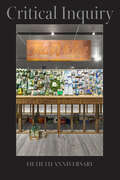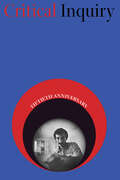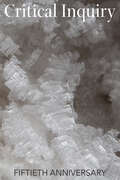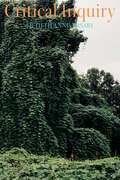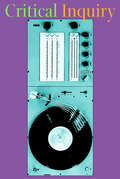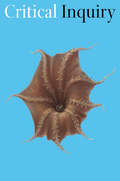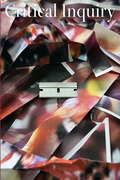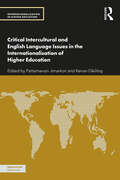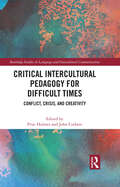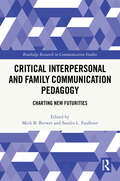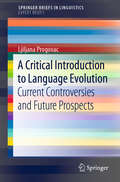- Table View
- List View
The Critical History of Edgar Allan Poe's The Narrative of Arthur Gordon Pym: A Dialogue with Unreason (Garland Studies in 19th Century American Literature #Vol. 8)
by Ronald C. HarveyFirst published in 1999. Routledge is an imprint of Taylor & Francis, an informa company.
A Critical History of French Children's Literature: Volume Two: 1830-Present (Children's Literature and Culture)
by Penelope E. BrownThis two-volume critical history of French children’s literature from 1600 to the present helps bring awareness of the range, quality, and importance of French children’s literature to a wider audience. The works of a number of French writers, notably La Fontaine, Charles Perrault, Jules Verne, and Saint-Exupéry were, and continue to be, widely translated and adapted, and have influenced the development of the genre in other countries.
A Critical History of French Children's Literature: Volume One: 1600–1830 (Children's Literature and Culture)
by Penelope E. BrownThese books are the first full-length, comprehensive study written in English of French children’s literature. They provide both an overview of developments from the seventeenth century to the present day and detailed discussion of texts that are representative, innovative, or influential best-sellers in their own time and beyond. French children’s literature is little known in the English-speaking world and, apart from a small number of writers and texts, has been relatively neglected in scholarly studies, despite the prominence of the study of children’s literature as a discipline. This project is groundbreaking in its coverage of a wide range of genres, tracing the evolution of children’s books in France from early courtesy books, fables and fairy tales, to eighteenth-century moral tales and educational drama, nineteenth-century novels of domestic realism and adventure stories and contemporary detective fiction and fantasy novels. The discussion traces the relationship between children’s literature and social change, revealing the extent to which children’s books were informed by pedagogical, moral, religious and political agenda and explores the implications of the dual imperatives of instruction and amusement which have underpinned writing for young readers throughout the centuries.
Critical Humanist Perspectives: The Integrational Turn in Philosophy of Language and Communication (Routledge Advances in Communication and Linguistic Theory)
by Adrian PabléThe present book is a collection of scholarly reflections on the theme of humanism from an integrational linguistic perspective. It studies humanist thought in relation to the philosophy of language and communication underpinning it and considers the question whether being a ‘humanist’ binds one to a particular view of language. The contributions to this volume explore whether integrational linguistics, being informed by a non-mainstream semiology and adopting a lay linguistic perspective, can provide better answers to contentious ontological and epistemological questions concerning the humanist project – questions having to do with the self, reason, authenticity, creativity, free agency, knowledge and human communication. The humanist perspectives adopted by the contributors to this volume are critical insofar as they start from semiological assumptions that challenge received notions within mainstream linguistics, such as the belief that languages are fixed-codes of some kind, that communication serves the purpose of thought transfer, and that languages are prerequisites for communication.
Critical Incidents in Journalism: Pivotal Moments Reshaping Journalism around the World
by Edson C. Tandoc Jr. Joy Jenkins Ryan J. Thomas Oscar WestlundThis edited collection examines critical incidents journalists have faced across different media contexts, exploring how journalists and other key actors negotiate various aspects of their work. Ranging from the Rwandan genocide to the News of the World hacking scandal in the UK, this book defines a critical incident as an event that has led journalists to reconsider their routines, roles, and rules. Combining theoretical and practical analysis, the contributors offer a discussion of the key events that journalists cover, such as political turmoil or natural disasters, as well as events that directly involve and affect journalists. Featuring case studies from countries including Australia, Germany, Brazil, Kenya, and the Philippines, the book explores the discourses that critical events have generated, how journalists and other stakeholders have responded to them, and how they have reshaped (or are reshaping) journalistic norms and practices. The book also proposes a roadmap for studying such pivotal moments in journalism. This one-of-a-kind collection is a valuable resource for students and scholars across journalism studies disciplines, from journalism history, to sociology of news, to digital journalism and political communication.
Critical Inquiry
by Michael BoylanA succinct handbook on reading and responding critically to argumentative texts, suitable alike for courses in informal logic and the argumentative/persuasive essay. aa
Critical Inquiry, volume 48 number 1 (Autumn 2021)
by Critical InquiryThis is volume 48 issue 1 of Critical Inquiry. Critical Inquiry is a peer-reviewed interdisciplinary journal devoted to the best critical thought in the arts and humanities. Combining a commitment to rigorous scholarship with a vital concern for dialogue and debate, the journal presents articles by eminent and emerging scholars, critics, and artists on a wide variety of issues in contemporary criticism and culture. Associated with no single school of thought, tied to no single discipline, Critical Inquiry is dedicated to providing a forum for cutting-edge thought while reconsidering traditional concepts and practices.
Critical Inquiry, volume 48 number 2 (Winter 2022)
by Critical InquiryThis is volume 48 issue 2 of Critical Inquiry. Critical Inquiry is a peer-reviewed interdisciplinary journal devoted to the best critical thought in the arts and humanities. Combining a commitment to rigorous scholarship with a vital concern for dialogue and debate, the journal presents articles by eminent and emerging scholars, critics, and artists on a wide variety of issues in contemporary criticism and culture. Associated with no single school of thought, tied to no single discipline, Critical Inquiry is dedicated to providing a forum for cutting-edge thought while reconsidering traditional concepts and practices.
Critical Inquiry, volume 48 number 3 (Spring 2022)
by Critical InquiryThis is volume 48 issue 3 of Critical Inquiry. Critical Inquiry is a peer-reviewed interdisciplinary journal devoted to the best critical thought in the arts and humanities. Combining a commitment to rigorous scholarship with a vital concern for dialogue and debate, the journal presents articles by eminent and emerging scholars, critics, and artists on a wide variety of issues in contemporary criticism and culture. Associated with no single school of thought, tied to no single discipline, Critical Inquiry is dedicated to providing a forum for cutting-edge thought while reconsidering traditional concepts and practices.
Critical Inquiry, volume 48 number 4 (Summer 2022)
by Critical InquiryThis is volume 48 issue 4 of Critical Inquiry. Critical Inquiry is a peer-reviewed interdisciplinary journal devoted to the best critical thought in the arts and humanities. Combining a commitment to rigorous scholarship with a vital concern for dialogue and debate, the journal presents articles by eminent and emerging scholars, critics, and artists on a wide variety of issues in contemporary criticism and culture. Associated with no single school of thought, tied to no single discipline, Critical Inquiry is dedicated to providing a forum for cutting-edge thought while reconsidering traditional concepts and practices.
Critical Inquiry, volume 49 number 1 (Autumn 2022)
by Critical InquiryThis is volume 49 issue 1 of Critical Inquiry. Critical Inquiry is a peer-reviewed interdisciplinary journal devoted to the best critical thought in the arts and humanities. Combining a commitment to rigorous scholarship with a vital concern for dialogue and debate, the journal presents articles by eminent and emerging scholars, critics, and artists on a wide variety of issues in contemporary criticism and culture. Associated with no single school of thought, tied to no single discipline, Critical Inquiry is dedicated to providing a forum for cutting-edge thought while reconsidering traditional concepts and practices.
Critical Inquiry, volume 49 number 2 (Winter 2023)
by Critical InquiryThis is volume 49 issue 2 of Critical Inquiry. Critical Inquiry is a peer-reviewed interdisciplinary journal devoted to the best critical thought in the arts and humanities. Combining a commitment to rigorous scholarship with a vital concern for dialogue and debate, the journal presents articles by eminent and emerging scholars, critics, and artists on a wide variety of issues in contemporary criticism and culture. Associated with no single school of thought, tied to no single discipline, Critical Inquiry is dedicated to providing a forum for cutting-edge thought while reconsidering traditional concepts and practices.
Critical Inquiry, volume 49 number 3 (Spring 2023)
by Critical InquiryThis is volume 49 issue 3 of Critical Inquiry. Critical Inquiry is a peer-reviewed interdisciplinary journal devoted to the best critical thought in the arts and humanities. Combining a commitment to rigorous scholarship with a vital concern for dialogue and debate, the journal presents articles by eminent and emerging scholars, critics, and artists on a wide variety of issues in contemporary criticism and culture. Associated with no single school of thought, tied to no single discipline, Critical Inquiry is dedicated to providing a forum for cutting-edge thought while reconsidering traditional concepts and practices.
Critical Inquiry, volume 49 number 4 (Summer 2023)
by Critical InquiryThis is volume 49 issue 4 of Critical Inquiry. Critical Inquiry is a peer-reviewed interdisciplinary journal devoted to the best critical thought in the arts and humanities. Combining a commitment to rigorous scholarship with a vital concern for dialogue and debate, the journal presents articles by eminent and emerging scholars, critics, and artists on a wide variety of issues in contemporary criticism and culture. Associated with no single school of thought, tied to no single discipline, Critical Inquiry is dedicated to providing a forum for cutting-edge thought while reconsidering traditional concepts and practices.
Critical Inquiry, volume 50 number 1 (Autumn 2023)
by Critical InquiryThis is volume 50 issue 1 of Critical Inquiry. Critical Inquiry is a peer-reviewed interdisciplinary journal devoted to the best critical thought in the arts and humanities. Combining a commitment to rigorous scholarship with a vital concern for dialogue and debate, the journal presents articles by eminent and emerging scholars, critics, and artists on a wide variety of issues in contemporary criticism and culture. Associated with no single school of thought, tied to no single discipline, Critical Inquiry is dedicated to providing a forum for cutting-edge thought while reconsidering traditional concepts and practices.
Critical Inquiry, volume 50 number 2 (Winter 2024)
by Critical InquiryThis is volume 50 issue 2 of Critical Inquiry. Critical Inquiry is a peer-reviewed interdisciplinary journal devoted to the best critical thought in the arts and humanities. Combining a commitment to rigorous scholarship with a vital concern for dialogue and debate, the journal presents articles by eminent and emerging scholars, critics, and artists on a wide variety of issues in contemporary criticism and culture. Associated with no single school of thought, tied to no single discipline, Critical Inquiry is dedicated to providing a forum for cutting-edge thought while reconsidering traditional concepts and practices.
Critical Inquiry, volume 50 number 3 (Spring 2024)
by Critical InquiryThis is volume 50 issue 3 of Critical Inquiry. Critical Inquiry is a peer-reviewed interdisciplinary journal devoted to the best critical thought in the arts and humanities. Combining a commitment to rigorous scholarship with a vital concern for dialogue and debate, the journal presents articles by eminent and emerging scholars, critics, and artists on a wide variety of issues in contemporary criticism and culture. Associated with no single school of thought, tied to no single discipline, Critical Inquiry is dedicated to providing a forum for cutting-edge thought while reconsidering traditional concepts and practices.
Critical Inquiry, volume 50 number 4 (Summer 2024)
by Critical InquiryThis is volume 50 issue 4 of Critical Inquiry. Critical Inquiry is a peer-reviewed interdisciplinary journal devoted to the best critical thought in the arts and humanities. Combining a commitment to rigorous scholarship with a vital concern for dialogue and debate, the journal presents articles by eminent and emerging scholars, critics, and artists on a wide variety of issues in contemporary criticism and culture. Associated with no single school of thought, tied to no single discipline, Critical Inquiry is dedicated to providing a forum for cutting-edge thought while reconsidering traditional concepts and practices.
Critical Inquiry, volume 51 number 1 (Autumn 2024)
by Critical InquiryThis is volume 51 issue 1 of Critical Inquiry. Critical Inquiry is a peer-reviewed interdisciplinary journal devoted to the best critical thought in the arts and humanities. Combining a commitment to rigorous scholarship with a vital concern for dialogue and debate, the journal presents articles by eminent and emerging scholars, critics, and artists on a wide variety of issues in contemporary criticism and culture. Associated with no single school of thought, tied to no single discipline, Critical Inquiry is dedicated to providing a forum for cutting-edge thought while reconsidering traditional concepts and practices.
Critical Inquiry, volume 51 number 2 (Winter 2025)
by Critical InquiryThis is volume 51 issue 2 of Critical Inquiry. Critical Inquiry is a peer-reviewed interdisciplinary journal devoted to the best critical thought in the arts and humanities. Combining a commitment to rigorous scholarship with a vital concern for dialogue and debate, the journal presents articles by eminent and emerging scholars, critics, and artists on a wide variety of issues in contemporary criticism and culture. Associated with no single school of thought, tied to no single discipline, Critical Inquiry is dedicated to providing a forum for cutting-edge thought while reconsidering traditional concepts and practices.
Critical Inquiry, volume 51 number 3 (Spring 2025)
by Critical InquiryThis is volume 51 issue 3 of Critical Inquiry. Critical Inquiry is a peer-reviewed interdisciplinary journal devoted to the best critical thought in the arts and humanities. Combining a commitment to rigorous scholarship with a vital concern for dialogue and debate, the journal presents articles by eminent and emerging scholars, critics, and artists on a wide variety of issues in contemporary criticism and culture. Associated with no single school of thought, tied to no single discipline, Critical Inquiry is dedicated to providing a forum for cutting-edge thought while reconsidering traditional concepts and practices.
Critical Intercultural and English Language Issues in the Internationalisation of Higher Education (Internationalization in Higher Education Series)
by Pattamawan Jimarkon Kenan DikilitaşInternationalisation is key to a modern and diverse higher education. Closely related to this is the successful integration of different cultures and languages. This book explores the dynamic relationships between English as a Lingua Franca (ELF), intercultural communication competence (ICC), internationalisation, and the use of the English language in international higher education.Featuring contributions from authors from Türkiye, Slovenia, Thailand, Taiwan and Norway, the chapters discuss topics such as translanguaging, language-related policies in internationalisation, issues of language and interculturality from a contextual point of view of pedagogy, and provide critical reflections on perceptions and orientations in support of higher education internationalisation. Ultimately, the book provides a comprehensive understanding of how the English language functions as a tool for intercultural engagement in academic settings, and the ways in which it is encountered and perceived by researchers, leaders, and practitioners.This book will be valuable reading for applied linguists, teacher educators and researchers, and graduate students in higher education involved in internationalised higher education through teaching, projects and activities.
Critical Intercultural Pedagogy for Difficult Times: Conflict, Crisis, and Creativity (Routledge Studies in Language and Intercultural Communication)
by Prue HolmesThis collection lends a critical decolonising lens to intercultural communication research, bringing together perspectives on how forms of education embedded in the arts and humanities can open up intercultural understanding among young people in conditions of conflict and protracted crises. The book draws on case studies from a range of educational contexts in the Global South which engage in creative arts methodologies to foreground decolonising approaches to intercultural communication in which researchers question their own power in the research process. The volume offers intercultural resources that can be used by researchers and community support groups to foster active intercultural communication, dialogue, participation, and responsibility among young people in these settings and those who may be marginalised from them. The collection also highlights the reflexive accounts of researchers working in a transnational, interdisciplinary, and multilingual research network and the subsequent opportunities and challenges of working in such networks. Advocating for intercultural understanding among young people in higher education and a greater focus on social justice in intercultural communication research, this book will be of interest to students and researchers in applied linguistics, language education, intercultural education, and multilingualism.
Critical Interpersonal and Family Communication Pedagogy: Charting New Futurities (Routledge Research in Communication Studies)
by Mick B. Brewer Sandra L. FaulknerThis volume establishes critical interpersonal and family communication pedagogy (CIFCP) as a distinct academic area of inquiry, highlighting the intersections of identity, power, culture, pedagogy, and interpersonal and family communication concepts, theories, and methods.This practical, theoretical, and aspirational collection by interpersonal and family communication (IPFC) scholars and teachers shines a spotlight on, through a diversity of methods, some of the ways that power both emanates within the classroom and informs intellectual instruction. Providing examples that connect critical theories and concepts with topics common in IPFC classrooms, such as conflict, relational tension, disclosure, listening, and family dynamics, the book illustrates how critical concepts can be uniquely addressed and unpacked in IPFC classrooms through a variety of assignments, teaching activities, and discussion prompts, and promotes and normalizes the ongoing reflexive practices of IPFC instructors.This book will interest academics and upper-level students working in the areas of Critical Methodology, Interpersonal Communication, Family Communication, and Relationship Science.
A Critical Introduction to Language Evolution: Current Controversies And Future Prospects (Springerbriefs In Linguistics Ser.)
by Ljiljana ProgovacThis book provides a critical introduction to the current views and controversies regarding language evolution. It sheds new light on hot topics such as: How ancient is language? Did Neanderthals have some form of language? Did language evolve gradually and incrementally, through stages, or suddenly, in one leap, in all its complexity? Does language evolution involve natural selection or not? This book is essential reading for scholars and students interested in language evolution, especially those in the fields of linguistics, psychology, biology, anthropology, and neuroscience.
